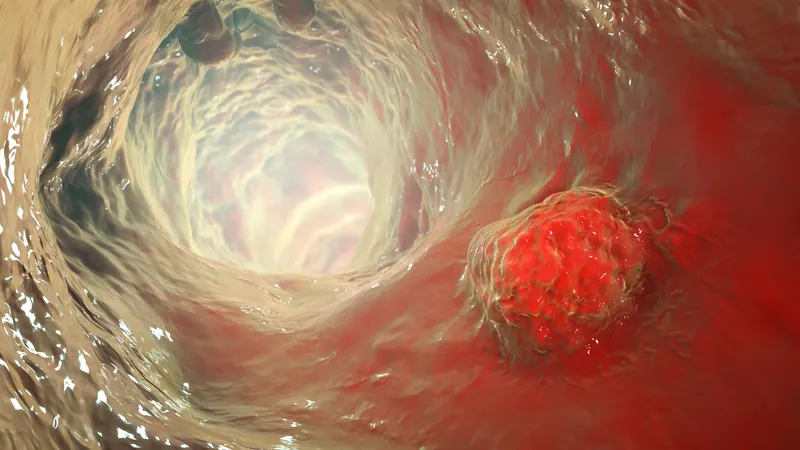
Could Your Diet Be Fueling Colorectal Cancer? Shocking New Research Reveals the Hidden Dangers of Ultra-Processed Foods!
2024-12-18
Author: Benjamin
Introduction
A groundbreaking study published in the esteemed journal Gut suggests a startling connection between ultra-processed foods and an increased risk of colorectal cancer (CRC). The researchers discovered that diets primarily composed of these unhealthy foods could lead to chronic inflammation that encourages tumor growth, raising alarm bells for health experts worldwide.
Colorectal Cancer Statistics
In the United States alone, an estimated 152,810 individuals are projected to be diagnosed with colorectal cancer in 2024, making it the second-leading cause of cancer-related deaths. CRC incidence has seen an alarming rise since the 1990s, particularly among those under 50, where the disease has tragically emerged as the leading cause of cancer death. The increase in cases has prompted urgent discourse around various environmental factors, including the troubling presence of microplastics often found in plastic bottles consumed by many.
Expert Insights
Dr. Andrew Wong, a primary care provider in Connecticut, highlights this emerging epidemic: “We know cancer has increased 13% in the last 10 years in people under 50, probably the biggest consumers of bottled water. The risk of colon cancer is now two to four times higher in individuals born after 1990.”
The Role of Ultra-Processed Foods
The rise in chronic diseases, obesity, and cancers has turned the spotlight onto ultra-processed foods. These are defined as products extensively modified from their original form, typically laden with excess salt, sugar, unhealthy oils, and artificial additives. Common offenders include deli meats, mass-produced breads, packaged snacks, sugary cereals, and many frozen meals. Continuous high consumption of these foods is linked to increased inflammation, a precursor to numerous health complications.
Impact on Inflammation
Dr. Timothy Yeatman, a physician-scientist and professor in Florida, emphasizes the growing concern over diet-induced inflammation: "Patients with unhealthy diets have increased inflammation within their bodies. This inflammation has now been detected in colon tumors as well. Cancer acts similarly to a wound that fails to heal; a diet high in ultra-processed foods diminishes the body’s ability to heal due to ongoing inflammation and immune suppression."
Research Findings
The study meticulously examined how lipid dysregulation in CRC may arise from unresolved inflammation using advanced techniques such as liquid chromatography and tandem mass spectrometry (LC–MS/MS). Investigators analyzed a variety of human CRC samples, unveiling a stark imbalance in inflammatory mediators. They observed a significant over-production of arachidonic acid derivatives but noted a worrying deficiency in pro-resolving lipid mediators, suggesting a defective lipid class-switching mechanism that may exacerbate cancer development.
Conclusion and Recommendations
“An effective immune system can significantly influence the tumor microenvironment—but if inflamed by processed foods, its potential is weakened,” Dr. Yeatman warned.
With rising colorectal cancer rates, preventive measures are critical. Adopting a balanced, minimally processed diet rich in fresh produce, fish, and pasture-raised meats is crucial for mitigating CRC risk and enhancing overall well-being. Experts believe that a shift towards natural healing processes, moving beyond traditional drug treatments, could be revolutionary in cancer prevention and management.
This urgent call to action presents a pivotal opportunity to combat chronic inflammation and stave off disease. Don’t let your dietary choices fuel this epidemic—take control of your health today!









 Brasil (PT)
Brasil (PT)
 Canada (EN)
Canada (EN)
 Chile (ES)
Chile (ES)
 España (ES)
España (ES)
 France (FR)
France (FR)
 Hong Kong (EN)
Hong Kong (EN)
 Italia (IT)
Italia (IT)
 日本 (JA)
日本 (JA)
 Magyarország (HU)
Magyarország (HU)
 Norge (NO)
Norge (NO)
 Polska (PL)
Polska (PL)
 Schweiz (DE)
Schweiz (DE)
 Singapore (EN)
Singapore (EN)
 Sverige (SV)
Sverige (SV)
 Suomi (FI)
Suomi (FI)
 Türkiye (TR)
Türkiye (TR)